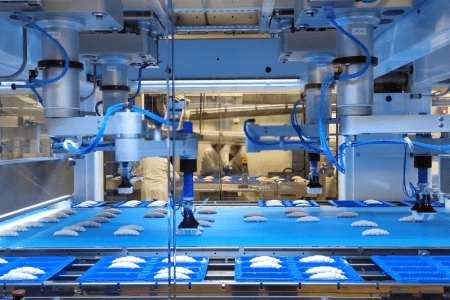How to design a dosing system that is turn-key, easily expandable and circular, delivering a final product of high quality and unique flavour
Why Choose an Automatic Dosing System?
Automating your dosing processes is essential for ensuring both efficiency and the highest product quality. It allows producers to control crucial parameters like temperature, pH, and atmosphere, preserving the integrity of ingredients and enhancing the final product’s flavour. By automating recipes, producers can ensure accuracy, consistency, and repeatability, which is vital when aiming for high volumes of distinct, high-quality food products.
A clear example of where automation is essential is in dough production, where temperature control is critical. Automated systems manage these variables reliably, eliminating human error and ensuring precision and consistency. In addition to improving process accuracy, these systems reduce material wastage, minimise contamination, and improve working conditions. Working with a partner that offers flexibility, continuity, and customisation, production lines become more streamlined, leading to natural, healthy, and aromatic products that modern consumers seek.
The design of an automated dosing system must meet the unique needs of each process. It requires more than just technical considerations—it involves collaboration across departments, from warehousing to marketing. The right system should also integrate technologies that improve raw material management while avoiding over-processing. Full traceability, customisable operator panels, and software for warehouse management are also crucial features.
With nearly 40 years of experience, CEPI understands how to meet these demands. Our solutions focus on flexibility and customisation, ensuring that the ingredients’ properties are preserved and that our technologies support a circular economy.
Technologies Preserving Ingredient Quality
CEPI’s fermentation systems produce a fragrant, digestible product while standardising processes and providing complete control. Flour cooling technologies ensure proper dough temperature management, which is essential in bread-making. Additionally, cold fat dosing maintains ingredient temperatures, preserving the organoleptic qualities of items like butter. These are just a few examples of how CEPI protects the quality of ingredients during processing.
How to Design an Effective Dosing System
Designing an automated dosing system is a complex task that requires a detailed analysis of the customer’s processes. Factors like material consumption, building specifications, humidity, and potential contamination must all be considered, as well as the need for sustainability. Successful system design also depends on the customer’s involvement from the very beginning of the planning process.
Bulk-handling systems are more than just silos and pipes—they are integral to a company’s overall operations. While planning typically involves three main stages—ingredient analysis, equipment installation, and connection to production—there is a preliminary phase that often goes unaddressed. This early stage involves aligning the automation of dosing processes with various company functions, including warehouse management, purchasing, and marketing. CEPI encourages customers to consider their future production needs when designing their system to ensure it can adapt or expand over time.
This comprehensive approach is essential during the system design process. CEPI gathers technical information about materials, recipes, and batches, but also supports customers in analysing their ingredients and understanding how they are received—whether in bulk, bags, or barrels. This helps match ingredients with the appropriate dosing process, identifying critical points for improvement and savings.
When planning a new production line, CEPI takes an overall view, considering not just the bulk-handling system but also other elements like mixers and packaging. Our team ensures that everything is planned in parallel to optimise both current and future production processes.
Involving Marketing and Other Departments
CEPI believes that all departments should contribute to the system design process, including marketing. Marketing teams have insight into future production needs and trends, ensuring the system remains adaptable for future expansion. This information is readily available within most companies but is not always considered when designing bulk-handling systems. CEPI’s approach ensures that every department, from production to marketing, is fully engaged in the planning process.
The customer’s experience is also critical. By guiding them through every stage of planning, CEPI ensures that the dosing system not only meets current needs but is also flexible enough to handle future growth. Our elastic approach to system design allows us to innovate continuously, ensuring that our technology remains cutting-edge and adaptable.
Supporting a Circular Economy
CEPI aims to deliver highly customised, turn-key solutions that manage the production line from storage to dosing. We view each system holistically, ensuring that storage, dosing, and conveying processes interact effectively. This integrated approach is key to achieving long-term durability and sustainability, aligning with the principles of the circular economy.
One of CEPI’s strengths is our ability to revitalise older systems through a process known as revamping. By updating existing installations, we can extend their useful life indefinitely. Many of our systems built over 30 years ago continue to function efficiently today. This long-term approach not only supports sustainability but also helps customers save costs by avoiding the need for complete system replacements.
Our decision to focus on turn-key installations has been strategic. It ensures that each system is tailored to the specific needs of the user, allowing for maximum efficiency and sustainability. This model also enables manufacturers to remain independent, managing their processes efficiently while maintaining alignment with the circular economy.
Examples of CEPI’s Innovative Technologies
CEPI offers a range of technologies that automate dosing while preserving ingredient quality. For instance, our fluidisation system ensures FIFO (First In, First Out) extraction, improving traceability and enabling faster, natural flour maturation. This enhances the flour’s rheological properties, making it more suitable for bread-making by improving elasticity and gas retention during leavening.
Another essential technology for bread-making is our flour cooling system. Seasonal changes in work areas and raw materials can cause significant temperature variations, affecting dough consistency. CEPI’s centralised cooling system gradually stabilises flour temperature, ensuring consistent product quality year-round. Unlike cooling agents, which introduce sudden and unstable temperature changes, our system guarantees stable, precise, and homogeneous dough temperatures.
CEPI’s fermentation technology is another innovation that meets the highest standards of precision and repeatability. It produces natural, aromatic products like rye, wheat, and multigrain breads with a long shelf life. Our technology covers everything from fermenters to yeast melters and bread re-work dissolvers, saving space, reducing additives, and automating the entire process.
Cold fat dosing is also an essential innovation, particularly for biscuits, cakes, and confectionery production. It stabilises ingredient temperatures, ensures precise dosing, and maintains higher hygiene standards in storage and production areas. By metering fat in paste form, it also makes the ingredients easier to incorporate into the dough, resulting in more efficient production.
CEPI’s vertical blender is another advanced system, ideal for producing premixes across various food sectors, including bakery, confectionery, ice cream, pasta, and cereals. This system is fast, accurate, and clean, creating a homogeneous mix of powders in just minutes, even for quantities as low as 1%. The vertical blender can dose directly into the mixer, streamlining production times and optimising batch consistency.
Integrated Automation for Complete Control
CEPI’s automated systems are fully integrated, offering hardware and software solutions that provide complete control over the production process. Our automation designs include customisable touch panels that manage recipe creation, ingredient and hopper parameters, real-time monitoring, and maintenance. These panels also control auxiliary functions like washing and climatisation.
CEPI’s integrated software, the Cepi Tracking System, offers full traceability, managing ingredient movements, lot control, and warehouse management. By collecting data from the production line in real-time, it provides detailed reports on ingredient consumption, stock levels, and batch trends. This system enhances food safety and regulatory compliance, ensuring optimal performance across the production process.
Future-Proofing with Industry 4.0 Integration
CEPI is fully prepared for Industry 4.0, offering systems designed for horizontal and vertical integration. Our solutions facilitate seamless communication between devices across the production line, allowing for efficient data exchange. CEPI’s automation systems are also easily integrated with global ERP systems, providing organisation-wide traceability and supporting departments such as Quality Control and Purchasing.
With decades of experience and a forward-thinking approach, CEPI ensures that its automated dosing systems are not only efficient and sustainable but also adaptable to the future needs of the food industry.
Read more latest industry news and developments in our free to download magazine.
Never miss a story… Follow us on:
International Bakery
@int_bakery
@Bakeryint
Media contact
Joseph Clarke
Editor, International Bakery
Tel: +44 (0) 1622 823 920
Email: editor@in-bakery.com






